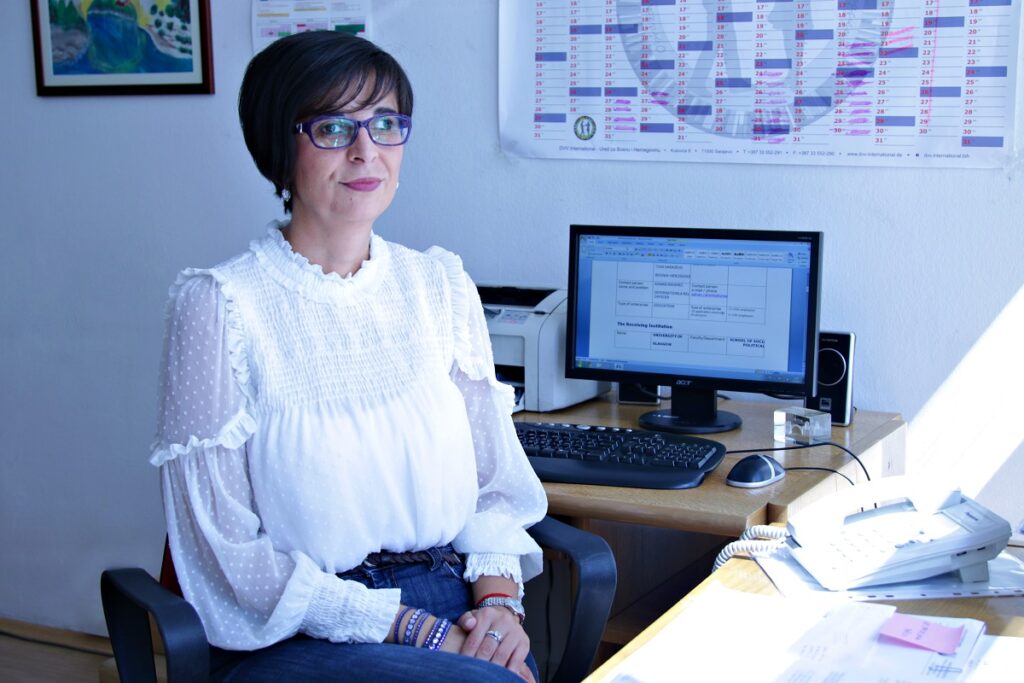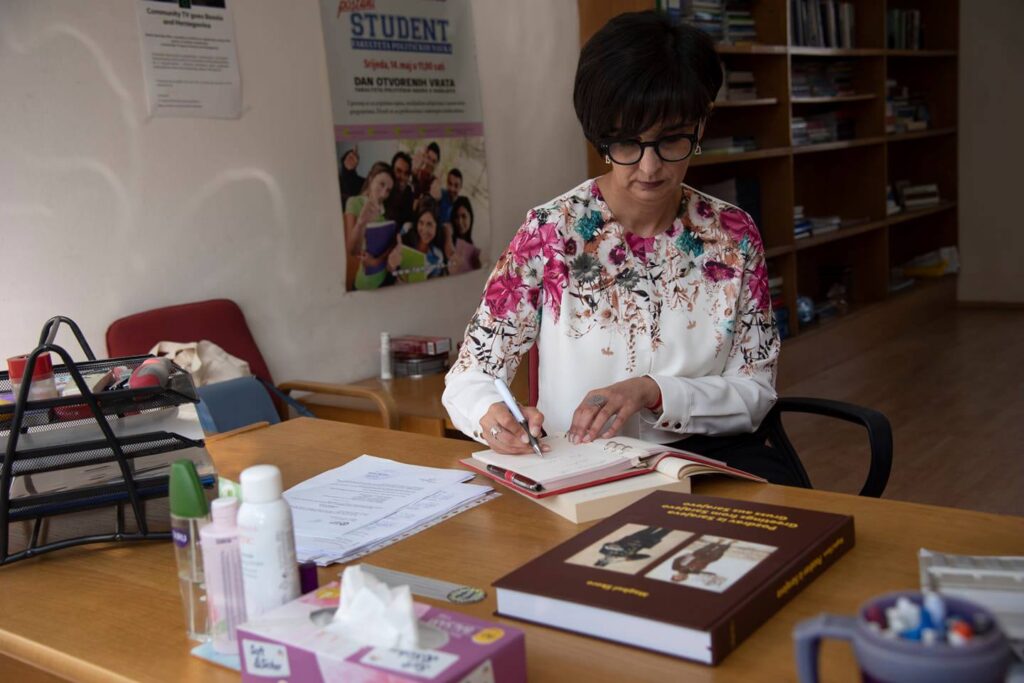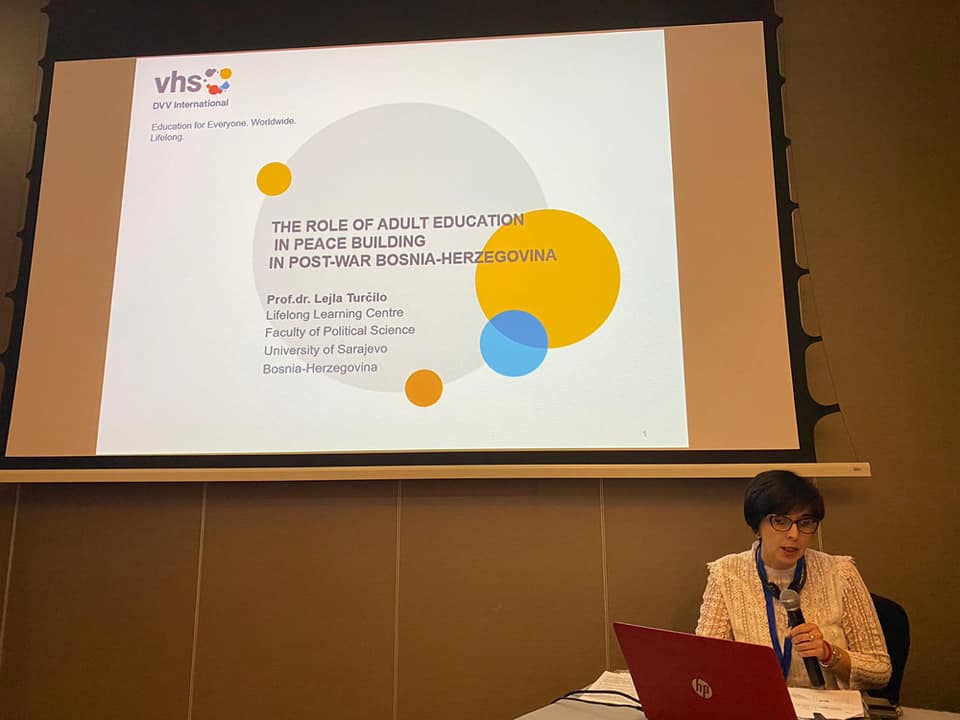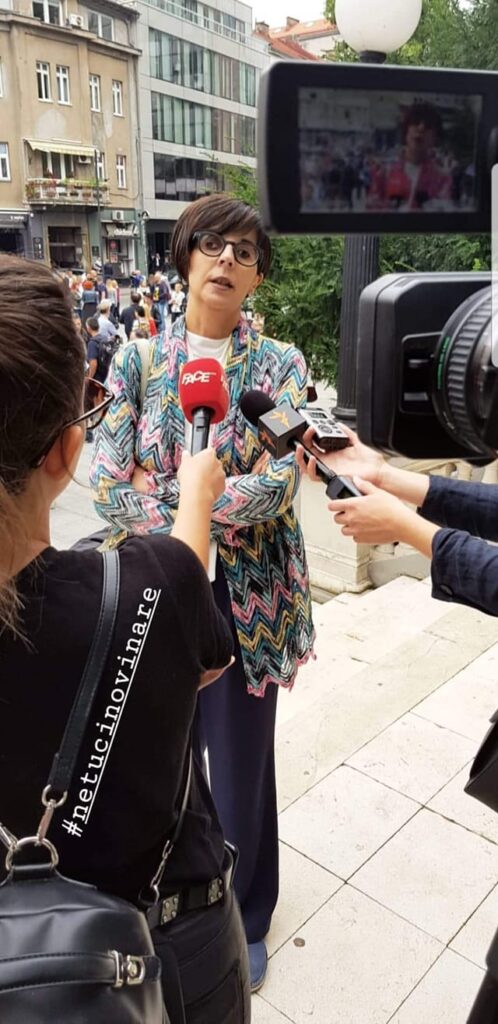
Dr. sci. Lejla Turčilo, full professor at the Department of Communication / Journalism, Faculty of Political Science, University of Sarajevo, was born in 1977 in Sarajevo, where she finished primary and secondary school. She received her bachelor’s, master’s and doctoral degrees from the Faculty of Political Science, University of Sarajevo (with the topic of her doctoral dissertation Media Ownership as a Form of Political Power: Reflections on Global Corporate Media in B&H).
She completed her professional training at the University of Oxford, UK (Annenberg-Oxford Media Summer Institute) and through the International Visitors Program of the United States Government, and was an International Fellow of the Government of the United Kingdom.
She teaches Media Theory, TV Journalism and Online Journalism at the bachelor study, Media and Politics at the master study and the course Shaping New Publics and PR at the doctoral study at the Faculty of Political Science, University of Sarajevo. At the Faculty of Islamic Sciences, University of Sarajevo, she teaches the course Contemporary Communication at the master’s degree.
She is the head of the Center for Lifelong Learning at the Faculty of Political Science, University of Sarajevo and the head of the Department of Communication / Journalism at the Faculty of Political Science, University of Sarajevo. She was also the vice dean for teaching at the Faculty of Political Sciences, University of Sarajevo.
She authored four published books:
– New-Normal and Media: Analysis and Thoughts on Media in COVID-19 Time (2021)
– Views on Media and Society: Articles, Essays, Research (2017)
– Take the Money and Run: Politics-Media-Business in Global Society and in B&H (2011)
– Online Communication and Offline Politics (2006)
She co-authored six books:
– Media and Information Literacy: Learning Design for 21st Century with E. Vajzović, M. Hibert, V. Vucetic, L. Silajdžić (2021)
– Media and Information Literacy: Research and Development, E. Vajzović, M. Hibert, A. Džihana, A. Osmić, H. Cerić, L. Silajdžić (2020)
– Media Reality: Essays on the Usage of Media in B&H with B. Buljubašić (2020)
– Pillar of Democracy on Shaky Ground: Public Service Media in South East Europe (ed. D. Fabijanić H. Sittig). (2019)
– Shrinking Space and Media in B&H: Silenced Alternative Voices with B. Buljubašić (2017)
– Information Literacy-Guidelines for the Development of Network Modules with S. Dizdar, B. Rašidović and L. Hajdarpašić (2012)
She co-authored one Manual:
– Politics, Media and Youth: Manual for Developing Political and Media Literacy of Youth (with J. Žiga and A. Osmić (2017))
She co-authored six research publications:
– Youth Study, B&H 2018. with A. Osmić, S. Šadić, A. Dudić, D. Kapidžić (2019)
– Alternative Facts and Post- Truth in B&H: Who (Really) Sets the Agenda with B. Buljubašić (2018)
– Invisible Europe: Media Picture of the EU Integrations in B&H with B. Buljubašić (2016)
– Study on Youth in B&H with J. Žiga, N. Džananović Miraščija, D. Kapidžić, S. Bašić, A. Osmić, J. Brkić Šmigoc (2014)
– Elections 2010: How Media Reported on the Election Campaign with R. Udovičić and D. Marko (2010)
– Minorities and Media in Bosnia and Herzegovina with J. Voćkić Avdagić, A. Nuhanović and V. Repovac (2010)
She was an editor of the three Proceedings:
– from the scientific conference Media and Public Interest (2016)
– from the scientific conference Media Literacy – Prerequisite for Responsible Media (2014)
– from the scientific conference Media Accountability: the Challenges of Globalization and the Specifics of the Region (2012)
She is an author of the report on the state of media literacy in Bosnia and Herzegovina, published in 2014 within the project “Mapping Media Literacy in Europe” at the University of Sorbonne, France. She is an author of the research report on the assessment of the media sector in Bosnia-Herzegovina (with D. Marko and M. Brunwasser, 2016).
She has published more than thirty scientific and professional papers in Bosnia and Herzegovina, Serbia, Croatia, Montenegro, France, Belgium, Germany, USA and Colombia. She has participated in numerous scientific and professional conferences, symposia and congresses in Bosnia and Herzegovina and abroad (list of papers and conferences available upon request).
She has mentored five Ph.D. thesis defended at the University of Sarajevo and University of Mostar, as well as more than 30 MA thesis at the University of Sarajevo.
She has been media literacy trainer for teachers in elementary high schools, librarians and students, within the UNESCO project Media and Information Literacy, implemented by the Institute of Social Research of the Faculty of Political Science, University of Sarajevo. She has also been a trainer for media literacy within the project of eTwinning implemented by APOSO B&H.
Within the course Online Journalism, she mentored practical work of students on the blog: https://fpnmladi.wordpress.com/
She is a member of the editorial board of the journal Adult Education in Sarajevo, B&H and the editorial board of the journal Media Studies in Zagreb, Croatia.
She is a member of the Association of Bh. journalists and author / columnist on the fact-checking portal Analiziraj.ba.
Can you tell us please something more about the start of your career?
Well, my career in journalism actually started when I was 14 years old and started working in Children Radio at Public Radio Station Radio Sarajevo. During my studies I worked at the Radio M, commercial radio station in Sarajevo and Radio ZID, Independent radio station in Sarajevo, and then in 2001 I started working at the University of Sarajevo, first on the project of cooperation between the Faculty of Political Science and School of Communication, Information and Library Studies of the Rutgers University in USA and after that in teaching. I actually studied journalism, since I was so in love with radio as media, but I ended up in the academia and I enjoy it very much.

How is it to be a professor in Bosnia and Herzegovina in the year 2021?
For me personally, inspiring, since I meet so many young and gifted people devoted to truth and hard work in order to make this country more transparent and better place. It is a privilege to share my knowledge with them and to work with them. Also, it is very challenging, since academic freedom is under strong attacks in many cases in the country and those rare brave academics who oppose to dominant ethno-nationalistic narratives are facing with shrinking space and sometimes even threats. It is not easy, but it is not boring either 🙂
Can you work independent as professor or you have some pressure from outside?
There are pressures. For example, at the moment I am facing with a strong character assasination campaign against me on social media, which started after I spoke openly about some irregularities in the academic community and at University in B&H. Some right-wing web portals and trolls on social media started spreading fake news and fueling hate speech against me and I even received threats. However, I also received such a great support from my students, from more than 30 colleagues from universities in B&H, Croatia, Serbia, Montenegro and Slovenia, from civil society and media community in B&H which makes me very proud and happy. So, to answer the questions, yes there are pressures, but it is our duty as professors to resist them.

What is for you the biggest motivation for you to work as professor?
My biggest motivation are my students and my main goal is to help them grow into the great journalist and professionals who work for the benefit of their society and who serve the truth and public interest.
How professional are media in Bosnia and Herzegovina?
There are many professional media in B&H in spite of all pressures and obstacles that they are facing. Of course, the situation is far from good. But, in many cases, when we are discussing the media situation in B&H we talk about unprofessional media, their influence on the public etc and we forget to mention those great people devoted to truth and public interest that every day enter the newsrooms in B&H and fight for better life in the country. My deepest respect goes to them.
How you see the general media situation in Bosnia and Herzegovina today?
Situation is far from good as I said. Media are in many cases divided along ethnic lines, there are many political and economic pressures, PBS is in very difficult position, public trust in media is detoriating, there is a flood of fake news and disinformation campaigns and hate speech in online media. Everything became even more complicated due to COVID 19 of course. But, I think that there are chances for the revival of media scene and public sphere in Bosnia and Herzegovina. What we need is a stronger alliance between media literate public and professional media. I see my role as an academic in recognizing both of them and connecting them together through my work.

How strong is the influence of politics and business on media in Bosnia and Herzegovina?
Very strong. All our research results, media monitorings and interviews with B&H journalists are listing political and economic influences as the biggest obstacles to freedom of media. This is precisely why I strongly support professional media and professional journalists in B&H, since I am more than aware of very very difficult political and economic climate in which they work.
